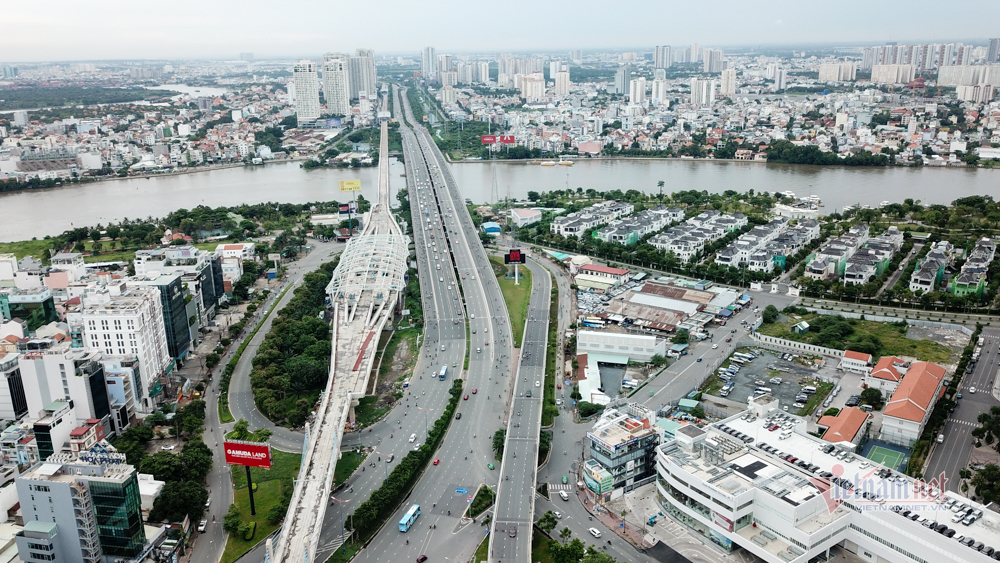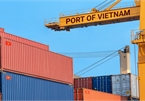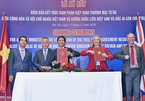This will be a challenge for Vietnamese leaders in the next 25 years, given Vietnam's current conditions. However, the aforementioned vision has strongly inspired and stirred up discussion among officials, party members, and people throughout the country.
Burning aspirations for building a strong nation
 |
|
Metro lines are being built to help develop public transport in Ho Chi Minh City. Photo: Thanh Tung
|
National independence and being a strong nation has always been a consistent aspiration of the Communist Party of Vietnam since its establishment. In May 1941, at the 8th meeting of the Central Party Committee, President Ho Chi Minh emphasized the interests of the people and the nation, namely independence and freedom.
In 1945, the letter of President Ho Chi Minh to Vietnamese students on the first day of school of the Democratic Republic of Vietnam mentioned the burning desire to bring our country "shoulder to shoulder with powers on the five continents". This spirit was again affirmed in the "Call" announced by President Ho Chi Minh in 1966: Building our country to be stronger and more beautiful.
After the country was unified and entered the reform period, "Rich people, strong country, democracy, justice, civilization" or a "developed and high income Vietnam by 2045" were the values and the vision representing the continuation of the aspirations to build a mighty nation of the senior generations of leaders.
Associated with each historical period, the visions of Vietnamese leaders always affirmed the Party's highest political mission as President Ho Chi Minh pointed out: "The Party is not an organization to make officials get rich. It must fulfill the task of liberating the nation, making the country rich, strong, and the people happy"; "Apart from the interests of the nation and the country, the Party has no other interests".
New context and challenges for leaders
Researchers have identified four main characteristics of the world today: complexity, interdependence, rapid change, and uncertainty.
These characteristics make challenges for leaders more difficult as problems formed by interrelated causes, which emerge in a rapidly changing context, with multiple subjects and interdependent interests, complex in relationships, and varied in opinion to evaluate or solve problems.
Facing new and difficult problems, leaders do not have a plan to deal with them. No single person or organization can solve or provide answers to these problems. This fact poses many challenges for traditional methods of leadership. In other words, the manner for national leadership needs to be adjusted to be able to adapt to and ensure the possibility of success for leadership visions.
"Prosperity", "might", "democracy", "justice", "civilization", "political trust"... are collective values that leaders at all levels are responsible to realize through practical activities.
This is also the basis to show that the biggest challenge for political leaders is to cultivate and protect common values, which are shared by members of the community, and are the foundation for the building a country of sustainable development.
Expectations about leaders
Certainly, they must always be aware of the interests of the people, of the nation and of the people. The spirit for the people, for the nation and the country is the continuation of the tradition of "doing in accordance with the will of the people" and this will be the solid basis for ensuring the Party's ruling.
The leaders in the new period cannot forget historical lessons: the post-Tran Dynasty failed because leaders neglected the people’s needs or the Ho Dynasty with high citadel, modern weapons, and apowerful defense force in both quality and quantity, but it still failed because it could not win the people's hearts.
In order to realize the leadership vision to 2045: making Vietnam a developed and high-income country, leaders at all levels must always be imbued with the thought that President Ho Chi Minh has set out: “Having people means having everything”; "All activities of the Party must come from the legitimate interests and aspirations of the people"; "the interests of the nation must be the first"; "Everything is successful by the word - consensus".
New requirement
To have consensus, officials and people unanimously aim for the same goal of building a developed and powerful nation; the cooperative philosophy must be the fundamental principle for leadership in the coming time. To establish a collaborative leadership style, leaders should pay attention to the following four requirements:
Firstly, understanding the context: There is a diversity of value in the contemporary world due to differences of the history, culture, society, geographical position, or political tradition of each country. Leadership challenges are also becoming increasingly diverse and leaders are unable to adopt a fixed measure to overcome the challenge.
Secondly, the sense of core political value system: Each nation and political system upholds and pursues their own political values. These political value systems will be the basis for evaluating success of leadership.
However, in reality, there is always a gap between the value system of political systems with values of diverse subjects (people, businesses, international actors). Therefore, to ensure success, leaders should always be aware of the harmony of values, the balance between the value system with those of different actors, thereby minimizing the risk of value conflict.
Thirdly, mastering the power process and structure of the governance system. In fact, more problems beyond the scope of authority that the leaders of each state can use are emerging in the world today.
This is a key feature of the context of leadership in the world that is more diverse in terms of interests and problem-solving perspectives. Therefore, in order to be successful, each leader must not only have a clear understanding of the power structure of the political system, but also have a deep understanding of modern governance models.
Fourthly, collaborative leadership capacity and skills: Leadership in the present world is no longer limited to a fixed territorial scope or structure of power.
The world's movement trends show that, at any level, leaders need to be able to collaborate with different actors to build collective commitments and make decisions based on consensus.
Dr. Nguyen Van Dang (Ho Chi Minh National Academy of Politics)

Why Vietnam’s outlook for 2021 looks bright?
The country is projected to grow 6.8% in 2021 on condition that the pandemic be contained.

2020 - year of opening the door to the world
Vietnam's export growth this year has been impressive thanks to the signing and approving of many free trade agreements (FTAs), reflecting the success of the country's steady and flexible international integration process.